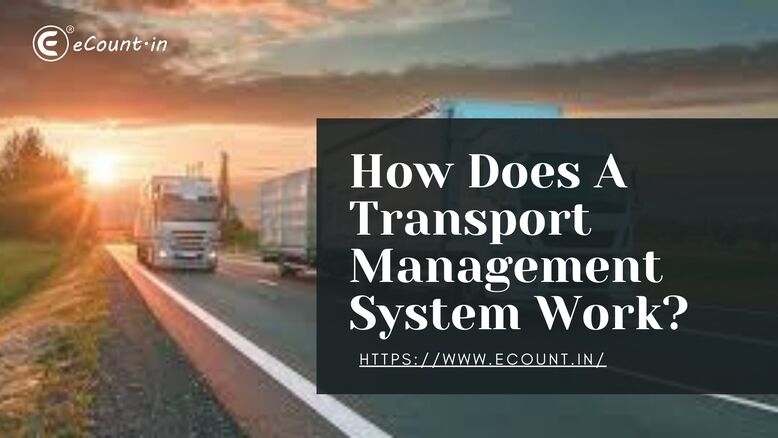How Does A Transport Management System Work?
12-08-2024

For many decades, India has been a leading country in the transportation of goods through shipments. Businesses had to go through so much inconvenience when transporting goods from India to across the world. Back then, no technology was introduced and transportation was tedious and complex.
Technological advancement has greatly impacted every industry, including supply chain management. The transportation businesses leverage the technology and over time business operations keep on getting more simplified and automated, enabling timely deliveries and effortless operations. All of these improvements have created more opportunities for new businesses. As a result, the level of competition increased steadily in the transportation market.
Nowadays, a transportation business can only survive if it utilizes automation in its operation with the help of a robust Transport Management System. However, it is of utmost importance to understand how the TMS solution works before you choose to acquire and implement one. Otherwise, there are more likely to be disruptions throughout the process and the business might not be able to utilize the solution at its best.
The cost of each solution can vary based on the requirements and what it offers. It becomes crucial for businesses to find the purpose of implementing the solution and acquire one based on transportation management system software cost.
In this blog post, we will help you get a detailed overview of the Transportation Management System and how it functions. At the end of this blog, you will gain a proper idea of a transport management solution to identify why and how you should implement it in your business operations. But first, let us go through actually what the Transport management solution is.
What is a TMS Transportation Management System?
To put it simply, the TMS transport management system is a platform that allows businesses to effectively plan, execute, and optimize the goods movement from one particular place to another. The system automates redundant processes, reducing the possibility of mistakes and disruption.
The solution also helps refine processes and keep track of the cargo throughout the journey. This way the transport managers have command over the movement of the cargo, able to make data-driven decisions. The TMS system is often considered an integral part of a larger supply chain management system.
Employee transport management system like eCount can provide monitoring and control over the shipments moving across continents without much restrictions. The transportation businesses that deal in the global market can leverage these solutions and enhance operational efficiency, adapt automation, and boost customer satisfaction.
These TMS transport management system solutions are not only used by the manufacturer (supplier), customer (buyer), third-party mediators (logistics services), and retail as well as e-commerce businesses. The way of use may vary based on the user, but the ultimate goal involves the transportation of goods from one location to another.
How Does the Transport Management System Operate?
The popularity of the TMS solution has been increasing at a significant rate in a few years, along with the competition. Supply chain management involves many complex processes that make the TMS one major aspect of any business that is in some way involved in the transportation of goods. Businesses have started to become aware of the benefits of the implementation it brings.
When planning to implement an Employee transport management system in your business operations, it becomes crucial first to understand the functions. It helps in utilizing the solution at its maximum efficiency. So, let us understand how the Transportation Management System is going to enhance business operations if you implement it. There are a total of 5 major functions of the TMS solution, which are:
1. Planning and Optimization
At its core, a TMS transport management system can be of great use for managers to effectively plan and optimize transport routes and schedules.
Managers have access to plan for the most efficient route and keep track of the shipment throughout. The TMS solution calculates the most ideal route according to the route distance, time, and overall cost it includes. It considers road conditions and forecasts traffic patterns. This can help in avoiding traffic-congested routes and reduce the idle time of the transportation vehicle.
The system helps maximize the vehicle’s load capacity including balancing the load across trucks/shipments. This will be beneficial for businesses to reduce the total number of trips, reducing the overall costs.
2. Execution
After the planning, the TMS transport management system moves its focus to execution. It assigns day-to-day transportation tasks earlier involving which vehicle and driver should `put into action.
Major complex processes become easier and automated with the help of the Transportation Management System. Therefore, managers and other executives can spend their valuable time in data-driven decision-making, which has a direct impact on the profitability of the business.
3. Tracking and Visibility
Transport managers can check the status of the load and shipment anytime it is required. Through this, they can identify any issues that are about to arise and address them effectively.
Also, when they have access to real-time information of the shipment they can keep the customer (buyer) up-to-date with it. This way transparency increases and boosts customer satisfaction as well. Ultimately, it brings more business to the companies and increases their revenue.
4. Freight Management
Important aspects of transportation management like freight management can be streamlined without any issue. The TMS transport management system simplifies the selection of the most suitable, effective, and cost-efficient carrier selection; helps in negotiating rates with the carriers and managing the freight booking process; and handles crucial documentation while ensuring that the business complies with all necessary regulations.
5. Integration
eCount offers the most reliable and robust Transportation Management System, which also provides smooth integration options with other systems to enhance operational efficiency. Businesses can integrate this system with the ERP solution, reducing bottlenecks and ensuring seamless data flow across all of the departments. This way the possibility of human mistakes and conflicts between departments decreases.